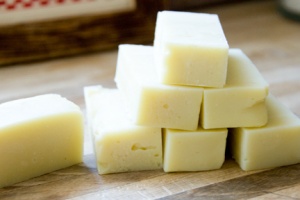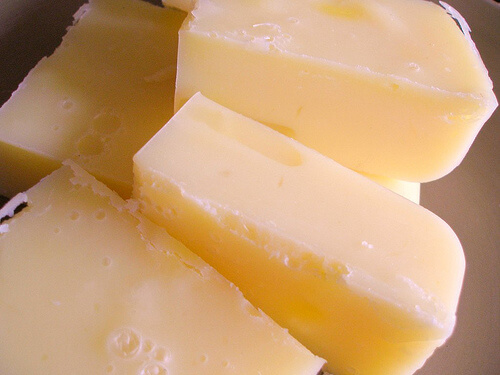Homemade Soap for Your Intimate Areas

Conventional soaps can harm your intimate areas, which require specific hygiene routines to stay healthy. For this reason, you should try making this homemade soap for your intimate areas.
In this article, you’ll find simple and effective recipes to create your very own homemade soap for your intimate areas. Notably, it is made with natural ingredients to prevent infections, itching and other discomforts. Additionally, it will help you keep your most intimate areas clean and healthy.
Reasons to avoid conventional soaps
Many women wash their genital area with the same soap they use to cleanse their body. However, it is best to use a soap specifically made with your feminine hygiene in mind.
This is because other soaps can contain harsh chemicals and materials that can harm the sensitive tissues found in these areas. Instead, using a product made with calming ingredients can help rebalance your pH levels and prevent infections for those who are prone to them.
Read more: How to Avoid Chemicals during Day-to-Day Activities
How to make this homemade soap for your intimate areas
Below, you’ll find a recipe for homemade soap for your intimate areas. Fortunately, it is simple to make and includes essential green tree tea oil and other natural ingredients that can help prevent yeast infections.

Ingredients
- 210 ml of coconut oil
- 30 gm of caustic soda
- 65 ml of distilled water
- Green tea tree essential oil
- Thyme essential oil
Tools
- Soap mold in any form you desire. However, don’t use aluminum.
- Gloves
- Hand whisk
- Bowl for mixing and heating
- Glass container
- Long-handled mixing spoon
Preparation
The steps ensure safety and quality. So, follow this recipe carefully.
- First, put on the gloves.
- Next, put the caustic soda in the glass container. Then, add the distilled water slowly to avoid spilling. The mixture will produce steam. So, cool the mixture in the refrigerator until it stops steaming. Ideally, this recipe should be prepared near a window or in a room with proper ventilation.
- Then, combine the coconut oil in a bowl over low heat. When it reaches around 40 degrees Celsius, remove it from the heat. Very carefully so that you avoid spilling, mix in the caustic soda with the hand mixer until it takes on the texture of a gel.
- Immediately, add 15 drops of green tea tree oil and 30 drops of thyme essential oil.
- Then, pour this mixture into the mold.
- Next, cover the mixture with a towel to help it maintain its temperature and complete the soap-making process. Leave to cool, between 12 and 24 hours, without moving or jostling it.
- Once it is completely cool, you can remove from the mold.
- Finally, leave it in a cool, dry space to allow it to harden. This should take around a month.
Learn more: Three Natural Soaps You Can Make at Home
Tips to care for your intimate areas
If you have a history of yeast infections, we recommend the following tips to help you maintain a healthy vaginal area.
- Use underwear made of natural materials such as cotton.
- After washing, you can protect and hydrate this area by applying marigold oil extract or salve with a clean applicator or cotton ball. In fact, marigolds have antibiotic and fungicidal properties to prevent vaginal infections.

- When you first suspect you might have a vaginal infection, apply a few drops of green tea tree oil to your pantyliner. When this area heats naturally, the oil’s healing and disinfecting properties will take effect.
- Wash your vaginal area with wipes made specifically for genital use.
- Throw out those conventional soaps. Instead, stick with products made of natural and organic materials.
- Remember that your vaginal health is directly related to your digestive health.
- A natural remedy you can try uses yogurt and salt water, mixed in equal measure, as an enema.
- Include foods proven to help prevent infections such as yogurt, kefir or garlic in your daily diet.
Images courtesy of mommyknows, Kim Becker, cuervo_J and Jess.
All cited sources were thoroughly reviewed by our team to ensure their quality, reliability, currency, and validity. The bibliography of this article was considered reliable and of academic or scientific accuracy.
- Chin KB, et al. (2013). The effect of tea tree oil on wound healing using a dressing model [Abstract]. DOI: 10.1089/acm.2012.0787
- Carson CF, Hammer KA, Riley TV. Melaleuca alternifolia (Tea Tree) oil: a review of antimicrobial and other medicinal properties. Clin Microbiol Rev. 2006;19(1):50-62. doi:10.1128/CMR.19.1.50-62.2006
- Akhtar N, et al. (2011). Calendula extract: effects on mechanical parameters of human skin.
ptfarm.pl/pub/File/Acta_Poloniae/2011/5/693.pdf - El Sevier. Cuidados de la zona íntima femenina. https://www.elsevier.es/es-revista-offarm-4-articulo-cuidados-zona-intima-femenina-13061798
- European Medicines Agency. (2018). Assessment report on Calendula officinalis L., floshttps://www.ema.europa.eu/en/documents/herbal-report/final-assessment-report-calendula-officinalis-l-flos-revision-1_en.pdf
- Clin Microbiol Rev. 2006 Jan; 19(1): 50–62. Melaleuca alternifolia (Tea Tree) Oil: a Review of Antimicrobial and Other Medicinal Properties. doi: 10.1128/CMR.19.1.50-62.2006
This text is provided for informational purposes only and does not replace consultation with a professional. If in doubt, consult your specialist.








